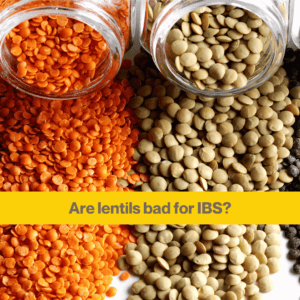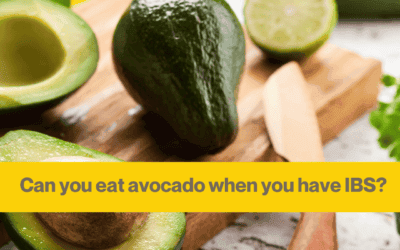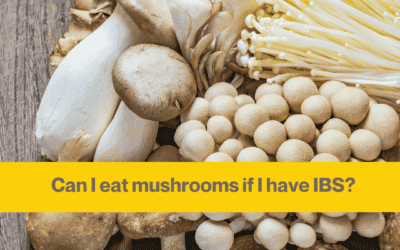Many people I work with are pretty scared of lentils. They are well known to cause gas in people, even if you don’t have IBS. So the thought of knowing eating something that might make things worse can be scary.
However, in this article I’d like to explain why lentils aren’t always a bad choice, and how you can start eating lentils again if you’ve stopped.
Benefits of lentils for people with IBS
Lentils are a cheap and effective way to bulk out your meals, and they are very healthy.
Lentils contain a slow digesting resistant starch. This means, when you eat them the glucose is slowly released in to your blood. This makes them suitable for people with diabetes or needing to work on blood sugar control.
Polyphenol content of lentils
Lentils may help protect against heart disease due to polyphenol content, a strong antioxidant that helps reduce oxidative stress.
They are also nutrient dense. They are packed with B vitamins, zinc and iron. These additions make them a great choice for people following a vegetarian diet.
How do lentils affect your digestion?
We all know lentils can cause a bit of gas, even in people who don’t have IBS. This is due to high levels of prebiotic fibre which feeds the beneficial bacteria in your large intestine. Your gut will find this type of fibre hard to break down, so it travels to the large intestine where the microbes can enjoy it.
When the bacteria ‘eat’ the fibre they create gasses, which can leave you feeling a bit bloated.
Lentils are high FODMAP
The specific type of fibre in lentils is called Galacto-oligosaccharides (GOS). This fibre could increase your bloating, gas and sensitivity. You can listen to my podcast episode below about how GOS affects your digestion.
When eaten in large amounts lentils can also contain fructan, another FODMAP.
Are lentils ok to eat if you have IBS?
It’s worth trying lentils again to see how you get on. Adding some diversity to the types of fibre you eat will improve your gut microbiome over time.
Tinned lentils can be low FODMAP at up to 45g per meal (around ¼ of a cup). If you rinse your tinned lentils well you will wash away some of the GOS, making it easier for you to digest.
Red and puy lentils cooked from scratch can become high FODMAP at just 23g per meal. Try eating these small portions regularly to build up your tolerance. This is around 2 tablespoons of lentils per meal.
How to start eating lentils with IBS
I really encourage you to try and include even small amounts of lentils and see if you can manage a little bit! Start by adding these low FODMAP amounts like 1-2 tablespoons to your meals once a week.
You may not have an issue with GOS, or any FODMAPs, so if you have IBS, it’s best to test your tolerance using the low FODMAP diet intervention. This is a clear process to remove all FODMAP foods for a few weeks, then slowly and carefully reintroduce them.
Read next – 5 confusing FODMAP foods and how to eat them
If you want help figuring out your IBS triggers, start your Gut Reset with me over 3 months to find a diet that works for you. Just set up a free call to discuss what you need some help with. Email info@goodnessme-nutrition.com
Download free IBS workbook
Get my top 5 non-food IBS management strategies for better digestion

IBS Nutritionist
Hi, I'm Anna Mapson, registered Nutritional Therapist.
I help people with IBS and SIBO get control of unpredictable gut symptoms to find long term relief from painful and embarrassing IBS without restrictive dieting.
I can help you to:
- understand your digestion better, so you recognise your triggers
- eat a well balanced diet, with tasty meals that are simple to prepare
- reintroduce your trigger foods so you can get back to enjoying food again
Find more about my 3 month 1:1 Gut Reset programme.
Can you eat avocado with IBS?
The Millennial food of choice, avocado is a really delicious and healthy. But is it any good for people with IBS? The benefits of eating avocado with IBS Avocados are great for adding healthy monounsaturated fats to your diet. This type of fat has been shown to...
Are mushrooms bad for IBS?
Have you ever considered mushrooms a trigger for your IBS? This blog post covers all you need to know to decide if you should keep eating them. The benefits of eating mushrooms with IBS Mushrooms are fungi and are very nutritious. Different species have different...
Which sweeteners are low FODMAP?
Living with Irritable Bowel Syndrome (IBS) often means making significant changes to your diet to avoid triggering symptoms. One common question I get as an IBS nutritionist is, “Which sweeteners are low FODMAP?”. In this article, I'll explore the various sweeteners...








Can I eat cooked onions and garlic with IBS and IBD?
Hi Patricia it depends 🙂 Some people will react to onions and garlic, and other people are completely fine with it. I’d suggest giving them a try if you haven’t already to see if you notice a difference. There is no reason to eliminate them if you don’t have a reaction to them.